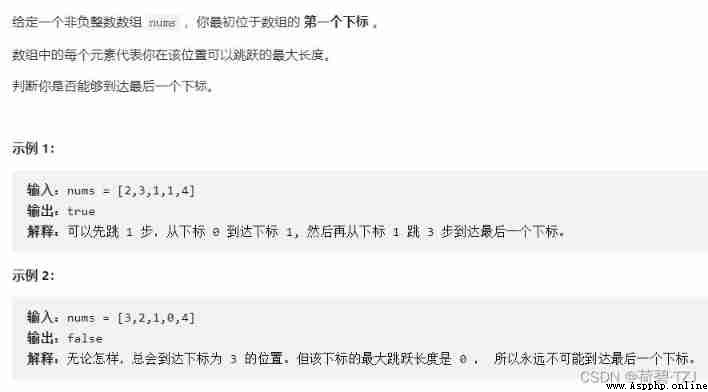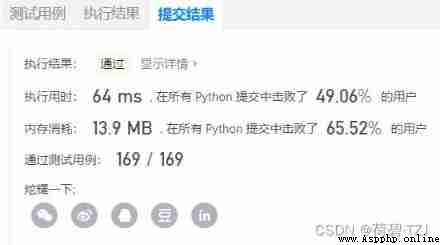
This question , If you use the idea of backpacking , The one-dimensional list is used to record whether the corresponding position can be reached , Such as dp[4] Indicates whether it is possible to start from ( Indexes 0) Reach index 4 The location of
class Solution(object):
def canJump(self, nums):
"""
:type nums: List[int]
:rtype: bool
"""
dp = [False for _ in range(len(nums))]
dp[0] = True
for loc, limit in enumerate(nums[:-1]):
if dp[loc]:
# Determine whether the current position is reachable
for pace in range(1, limit + 1):
# Enumerate jump distances
if loc + pace < len(nums) - 1:
dp[loc + pace] = True
else:
# prune : The current position can reach the destination directly
return True
return dp[-1] Suppose that in the worst case, each value in the array is close to its length , Then the worst time complexity of this algorithm is O( ), You can't pass the test without pruning
), You can't pass the test without pruning
Another idea of dynamic programming is , A one-dimensional list is used to represent the longest distance that the corresponding position can be moved . The equation of state transfer is as follows :
dp[idx] = max([ dp[idx - 1] - 1, num[idx] ])
And then to [3, 2, 1, 0, 4] For example , Just deduce the boundary conditions
class Solution(object):
def canJump(self, nums):
"""
:type nums: List[int]
:rtype: bool
"""
for idx in range(1, len(nums)):
state_1 = nums[idx - 1] - 1
state_2 = nums[idx]
if state_1 >= 0:
# This position can reach
nums[idx] = max([state_1, state_2])
else:
return False
if len(nums) <= 1 or nums[-2]:
return True
else:
return FalseCompared with backpacking , The time complexity has been reduced to O(n), But the test results are still not ideal
The idea is simple , Look directly at the comments of the code
class Solution(object):
def canJump(self, nums):
"""
:type nums: List[int]
:rtype: bool
"""
max_idx = 0
# Index of the farthest point reachable
target = len(nums) - 1
# Index of end point
for loc, pace in enumerate(nums):
if max_idx >= loc:
# Confirm the current point ( Indexes loc) It can reach
max_dist = max([loc + pace, max_idx])
# Compare and take the best
if max_dist >= target:
return True
return FalseI think so. , In many cases , Whether it is time complexity or space complexity , Greed is better than dynamic programming . But feeling greedy is a little mysterious , More practice
